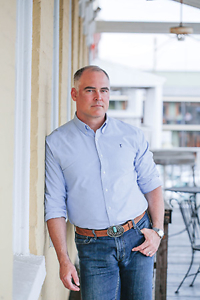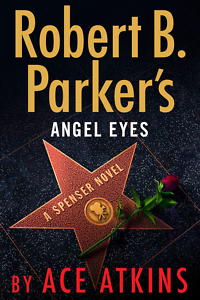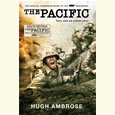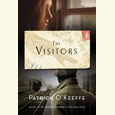Ah, California
Spenser heads to Los Angeles in Robert B. Parker’s Angel Eyes, Ace Atkins’ eighth novel in the iconic series
In Robert B. Parker’s Angel Eyes by Oxford, Mississippi-based writer Ace Atkins, Spenser leaves his familiar Boston stomping grounds to search for Gabby Leggett, a rising young LA model, TV actress, and social media influencer who has gone missing — at least according to the worried mother footing the detective’s bill. Of course Spenser makes a nuisance of himself at his first stop in what becomes a lengthy search through old Hollywood and seedier neighborhoods.

In the first few pages, the missing woman’s exasperated agent/boyfriend says to the iconic detective, “You don’t stop, do you?”
“It never suited me,” he replies.
As ever, Spenser’s nonstop manner harkens to Sam Spade and Philip Marlowe, especially when he is detecting in the land of palm trees, deviant producers, and cult leaders. More than 90 years ago, in September 1929, the hardboiled crime magazine Black Mask set the template for broad-shouldered, wisecracking, gun-toting gumshoes with the first installment of Dashiell Hammett’s The Maltese Falcon. That and similar stories also planted the modern detective in a home base: the West Coast, a mythical land of instant fortunes and broken dreams.
While Spenser’s charisma is intertwined with his intimate connection to Boston, his tough-guy methods fit the opposite coast like a well-worn trench coat. Parker recognized this, sending him to LA for several cases starting with the eighth novel in the series, aptly titled A Savage Place. Atkins does the same here in his eighth book in the series continuation. As with other recent installments, Atkins manages to walk a fine line between preserving a much-loved character and his entourage, yet allowing them all freedom to advance.
Hawk, Spenser’s familiar sidekick, sits this case out in Boston, and for most of the book his beloved Susan is just a smart voice on the phone (although she does appear late in the book in a scene too delicious to spoil in a review). For local assistance, Spenser relies instead on Zebulon Sixkill, a Native American former football star turned private eye, now working out of a strip mall near a vape shop, nail salon, and Thai massage parlor. Parker introduced Z in the novel Sixkill — his 39th and final Spenser book, published posthumously in 2010.
 Spenser and Z are soon joined by Chollo, a somewhat dodgy Spenser acquaintance who works for an aging crime boss, runs a food stand called “Chollo’s Churros,” and resembles a “Mexican Johnny Cash.” This trio faces off against thuggish Hollywood bodyguards and assorted members of the Armenian mob, coming ever closer to the missing star, who seems to have been drawn into a cultish self-empowerment group run by a failed bank robber.
Spenser and Z are soon joined by Chollo, a somewhat dodgy Spenser acquaintance who works for an aging crime boss, runs a food stand called “Chollo’s Churros,” and resembles a “Mexican Johnny Cash.” This trio faces off against thuggish Hollywood bodyguards and assorted members of the Armenian mob, coming ever closer to the missing star, who seems to have been drawn into a cultish self-empowerment group run by a failed bank robber.
The trio follows clues through a succession of mansions, dive bars, and diners, with Spenser referencing old songs, long-dead stars, and titular film characters, including Harvey and Mighty Joe Young. Readers can almost picture the detective sitting at the counter in Hopper’s “Nighthawks,” trading barbs with Marlowe on one stool and Spade on another.
“Weird is what I like to write,” Atkins told Chapter 16 in a 2015 interview about his own series character, Quinn Colson, a Mississippi sheriff who has so far appeared in nine books. Contemporary Los Angeles likewise provides plenty of weird for Spenser to observe. When not questioning sources or trading gunfire with thugs, the detective casts his sardonic eye on surroundings like the Santa Monica Pier:
I made it about halfway through the throngs of tourists and onlookers, past the monks in robes selling meditation books, the James Brown cover band offering a funk gospel to the masses, and down toward the agreed meeting spot: Pier Burger … The sun was getting lower and people gathered at the pier railing to watch surfers paddle into the oncoming waves. A woman in a pink string bikini roller-skated past me. A man wearing jeans, a Hawaiian shirt, and a bear head gazed wistfully into the sunset. Ah, California.
By combining classic Spenser wit with the reintroduction of Z as an LA detective in Angel Eyes, Atkins doesn’t just demonstrate mastery of the Spenser legend: He introduces a younger character who may be poised to lead the series forward into the second century of the American private eye.

Michael Ray Taylor’s book Hidden Nature, a mixture of memoir and subterranean natural history, will be published in the fall of 2020. He chairs the communication and theatre arts department at Henderson State University in Arkadelphia, Arkansas.


